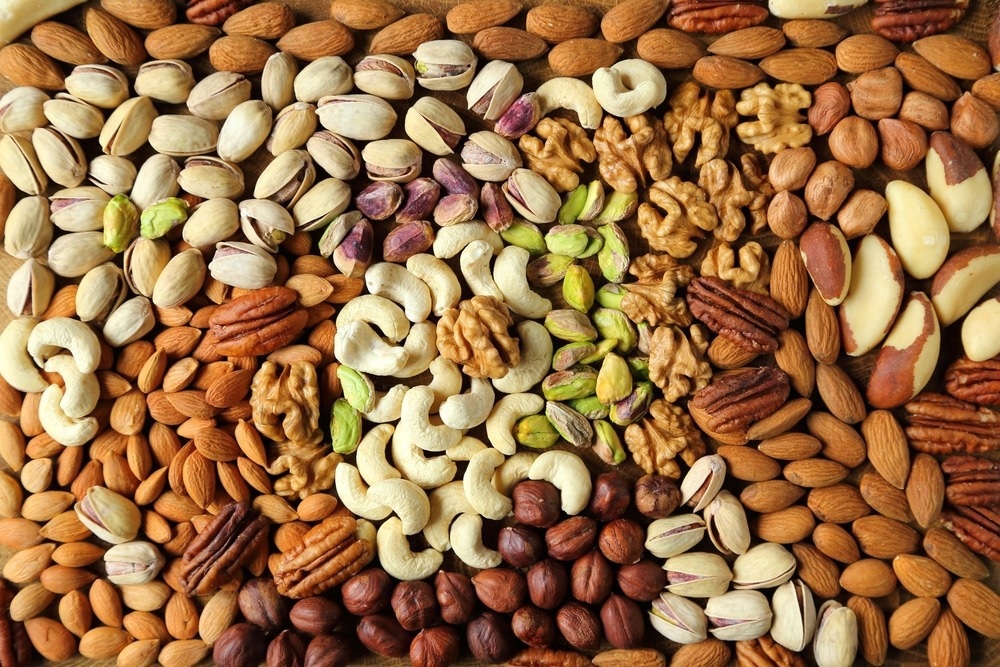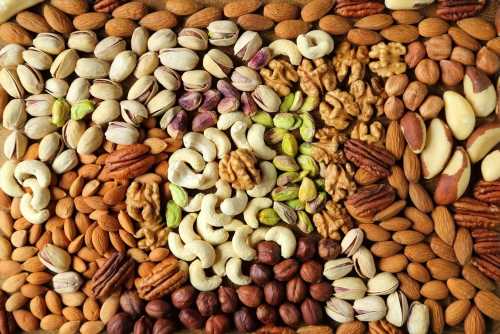In a recent study published in the Nutrients journal, researchers in Italy and the United States presented a comprehensive overview of the latest research on the impact of nut intake on gastrointestinal health.

Study: Effect of Nuts on Gastrointestinal Health. Image Credit: KrzysztofSlusarczyk/Shutterstock.com
Background
Nuts are considered to be nutrient-dense foods that are rich in healthy lipids, bioactive phytochemicals, and dietary fiber.
While the beneficial impact of nut consumption on various chronic illnesses has been extensively documented, particularly regarding their cardiometabolic benefits, there is a paucity of scientific evidence on their potential beneficial effects on gastrointestinal health.
The impact of nuts on gastrointestinal health
Alpha diversity refers to the diversity level within a specific microbial community. Alpha-diversity measures commonly consider the total number of species and their relative abundance. Chao-1 is a frequently used metric for quantifying species richness, while the Shannon index and Simpson index are commonly employed to assess species richness and evenness.
The recent study comparatively evaluated the effects of consuming almonds or graham crackers as a snack. The study reported significant alterations in the Chao-1 index and Shannon index.
Beta diversity refers to the variation in diversity among distinct communities. Qualitative plots are generated to display beta diversity for certain methods, such as UniFrac distances. Conversely, the distances of weighted UniFrac are quantitative.
In a series of four almond-related studies, it was found that two of them did not observe any impact on beta diversity when utilizing weighted and unweighted UniFrac distances. However, one study reported an elevation in beta diversity when using unweighted UniFrac distances, while another study measured beta diversity but did not present any data.
The impact of nut consumption on alpha- and beta-diversity exhibited variability. The observed disparities in the results could be attributed to several factors, including the differences in the duration of the intervention, the number of nuts administered, the level of dietary regulation during the intervention, the types of diets used for comparison, and the size of the study population.
The impact of nuts on microbial end products
Short-chain fatty acids: Short-chain fatty acids (SCFAs) are organic acids containing fewer than six carbon atoms.
They are produced by the fermentation of dietary fiber by gut bacteria in the colon. SCFAs are important for maintaining gut health and have been linked to various health benefits, including improved insulin sensitivity, reduced inflammation, and protection against colon cancer. The group of SCFAs comprises acetate, butyrate, and propionate.
The microbes or host may utilize these SCFAs as an energy substrate. The aforementioned molecular changes have the potential to trigger intracellular signaling pathways that can suppress the activation of nuclear factor kappa-B (NF-kB), alter the downstream inflammatory mediators, and enhance the function of the epithelial barrier.
Cancer Research eBook

There is a scarcity of nut intervention studies that have quantified the levels of fecal SCFAs. No significant alteration was observed in the fecal concentration of SCFAs in the control diet or individuals consuming either type of almond, as compared to the baseline.
Upon combination of data obtained from both forms of almonds, a comparatively elevated concentration of fecal butyrate was observed in contrast to the control group.
In a recent brief clinical investigation involving walnuts, it was observed that a three-day consumption of walnuts in individuals with good health led to alterations in the gut microbiome, along with an elevation in the levels of SCFAs.
Bile acids: Bile acids are a group of steroid acids synthesized in the liver and secreted into the small intestine to aid in the digestion and absorption of fats.
In a clinical trial comprising 18 participants, who were administered either walnuts or a control diet lacking walnuts for three weeks, the levels of fecal bile acids were assessed at the culmination of each intervention.
No significant variations were observed in the levels of primary bile acids quantified between the two dietary interventions.
The alterations in bile acid levels induced by walnuts suggest that walnuts may impact various cellular signaling pathways and, potentially, disease consequences via these end-products derived from microorganisms.
Gastrointestinal disease and walnut intake
Alpha-linolenic acid, a type of fatty acid found in walnuts, can be converted into docosahexaenoic acid and eicosapentaenoic acid.
These two compounds are known for their anti-inflammatory properties. A cohesive mechanism would probably encompass, to some extent, the impact on cells related to immunity and inflammation.
Elucidating the potential health advantages of incorporating walnuts into one's diet and exploring the impact of their phytochemical composition could catalyze additional investigations to uncover the underlying mechanisms responsible for disease prevention.
Studies have shown that consuming walnut fractions may protect against developing gastric mucosal lesions, such as gastritis, gastric ulcer, and gastric carcinoma.
A study observed that constituents of walnuts exhibited gastro-protective and cancer-preventive properties against inflammation caused by alcohol. The findings indicated a reduction in gastric lesions and a decrease in inflammation, which was linked to a decrease in inflammatory cytokines.
The ingestion of walnuts resulted in a notable decrease in the incidence of gastric cancer, along with a significant reduction in the levels of prostaglandin E2 (PGE2) and cyclooxygenase-2 (COX-2). These two pro-inflammatory mediators are crucial in the promotion of tumors.
Conclusion
The current review delineates the physiological mechanisms involved in the digestion of tree nuts. While certain research has indicated that the consumption of nuts may positively impact the microbiota, the results of clinical trials remain inconclusive.
It is noteworthy that investigations pertaining to the impact of nut consumption on microbial communities are in their preliminary stages.
Additionally, the findings are complicated by the extensive range of trial designs, research methodologies, subject age, and health status, as well as the quantity, variety, and duration of nut consumption.
- Mandalari, G. et al. (2023) "Effect of Nuts on Gastrointestinal Health", Nutrients, 15(7), p. 1733. doi: 10.3390/nu15071733. https://www.mdpi.com/2072-6643/15/7/1733
Posted in: Medical Science News | Medical Research News | Disease/Infection News
Tags: Alcohol, Alpha-Linolenic Acid, Anti-Inflammatory, Bacteria, Bile, Cancer, Carcinoma, Cardiometabolic, Chronic, Clinical Trial, Colon Cancer, Cytokines, Diet, Digestion, Docosahexaenoic Acid, Fatty Acids, Fermentation, Gastric Cancer, Gastritis, Gastrointestinal Disease, immunity, Inflammation, Insulin, Intracellular, Lipids, Liver, Microbiome, Nutrients, Phytochemical, Research, Short-Chain Fatty Acids, Small Intestine, Steroid, Ulcer, Walnut

Written by
Bhavana Kunkalikar
Bhavana Kunkalikar is a medical writer based in Goa, India. Her academic background is in Pharmaceutical sciences and she holds a Bachelor's degree in Pharmacy. Her educational background allowed her to foster an interest in anatomical and physiological sciences. Her college project work based on ‘The manifestations and causes of sickle cell anemia’ formed the stepping stone to a life-long fascination with human pathophysiology.
Source: Read Full Article
